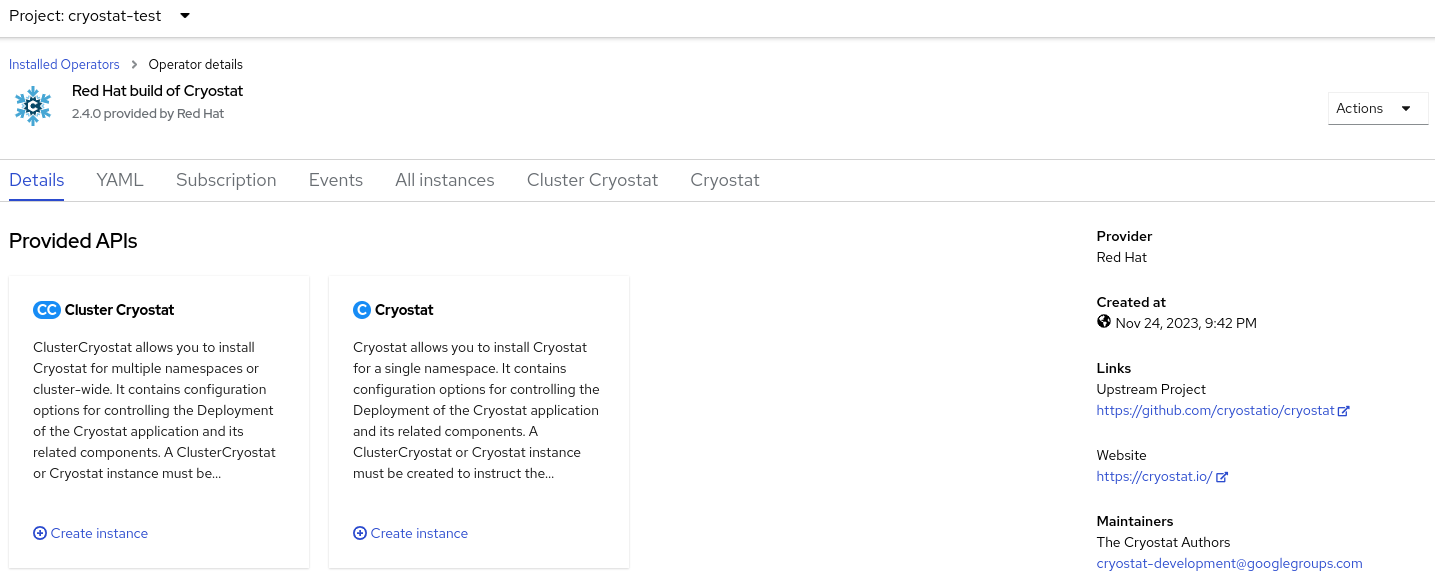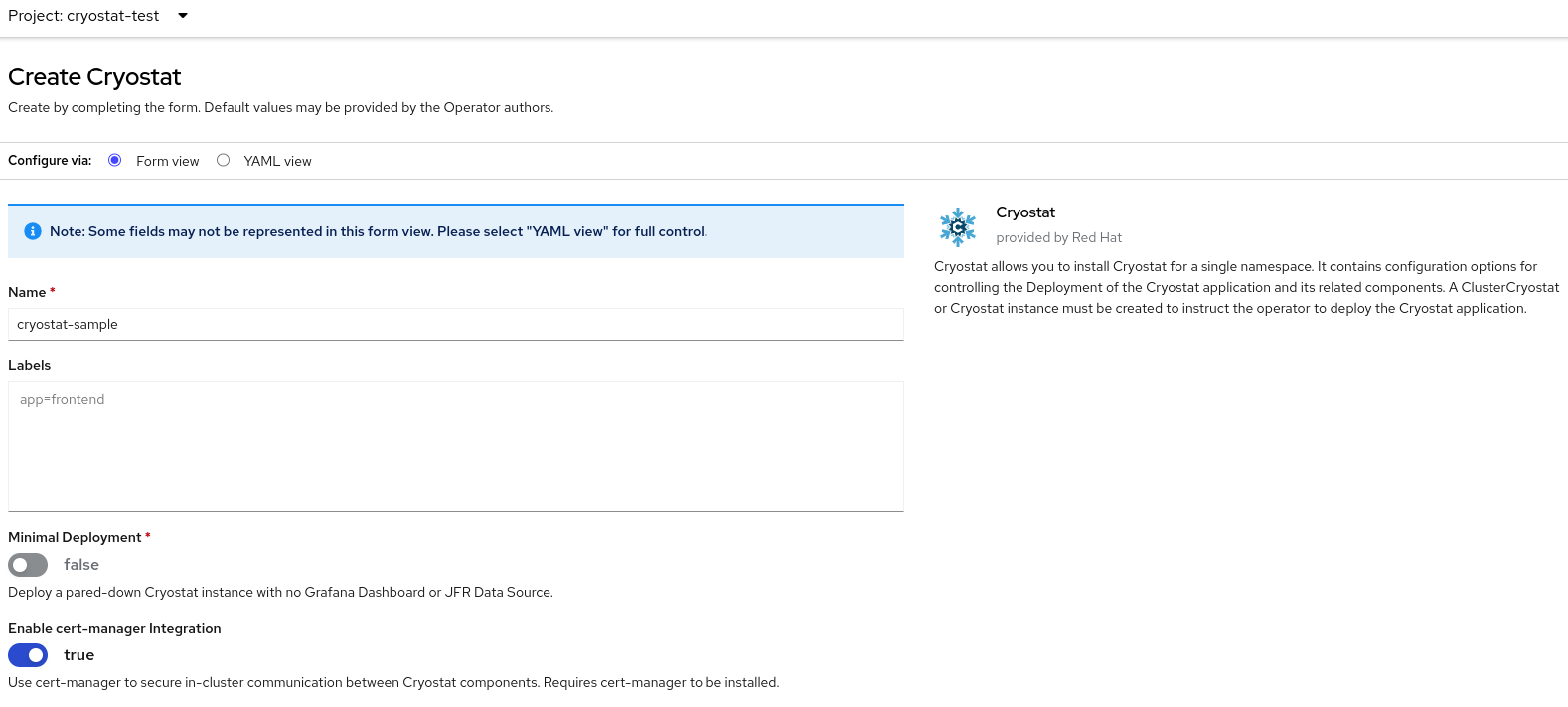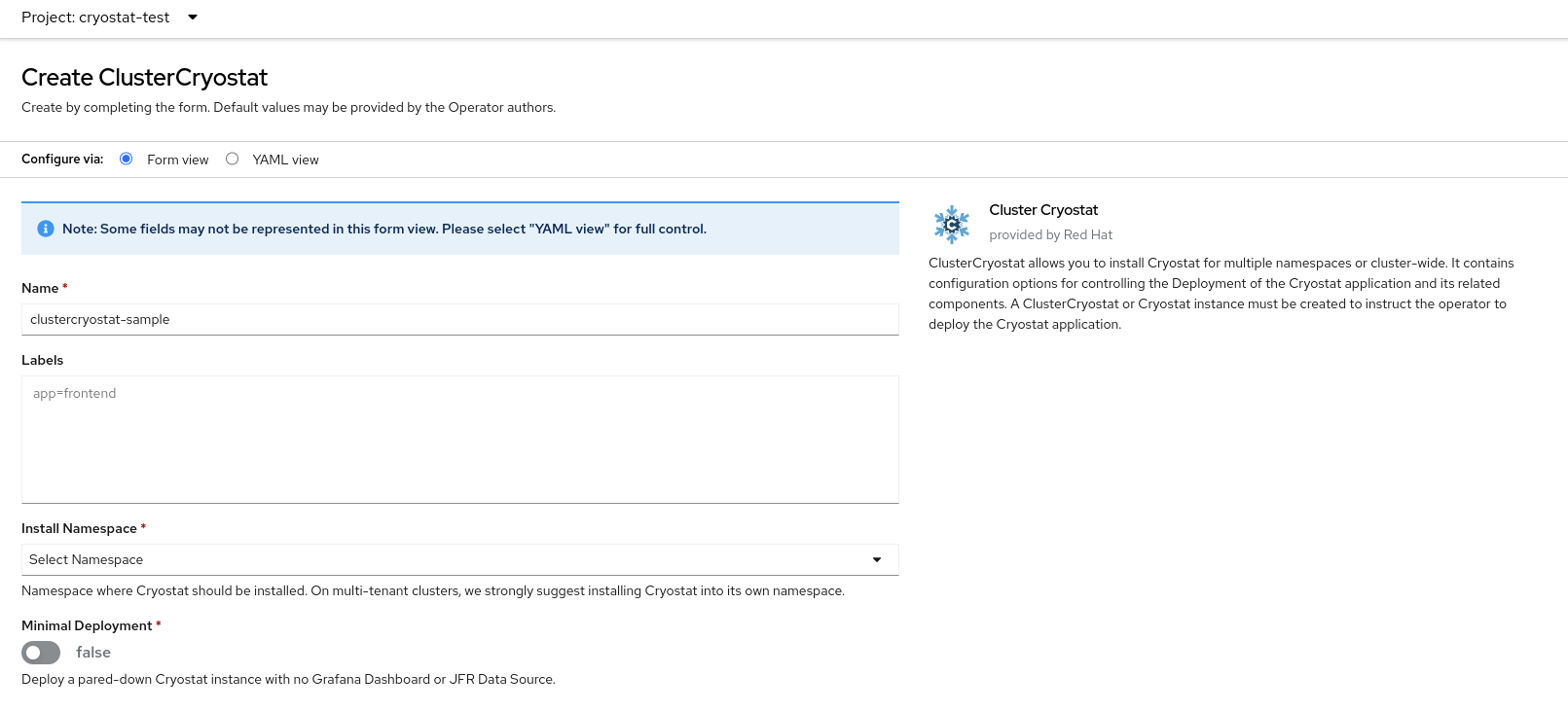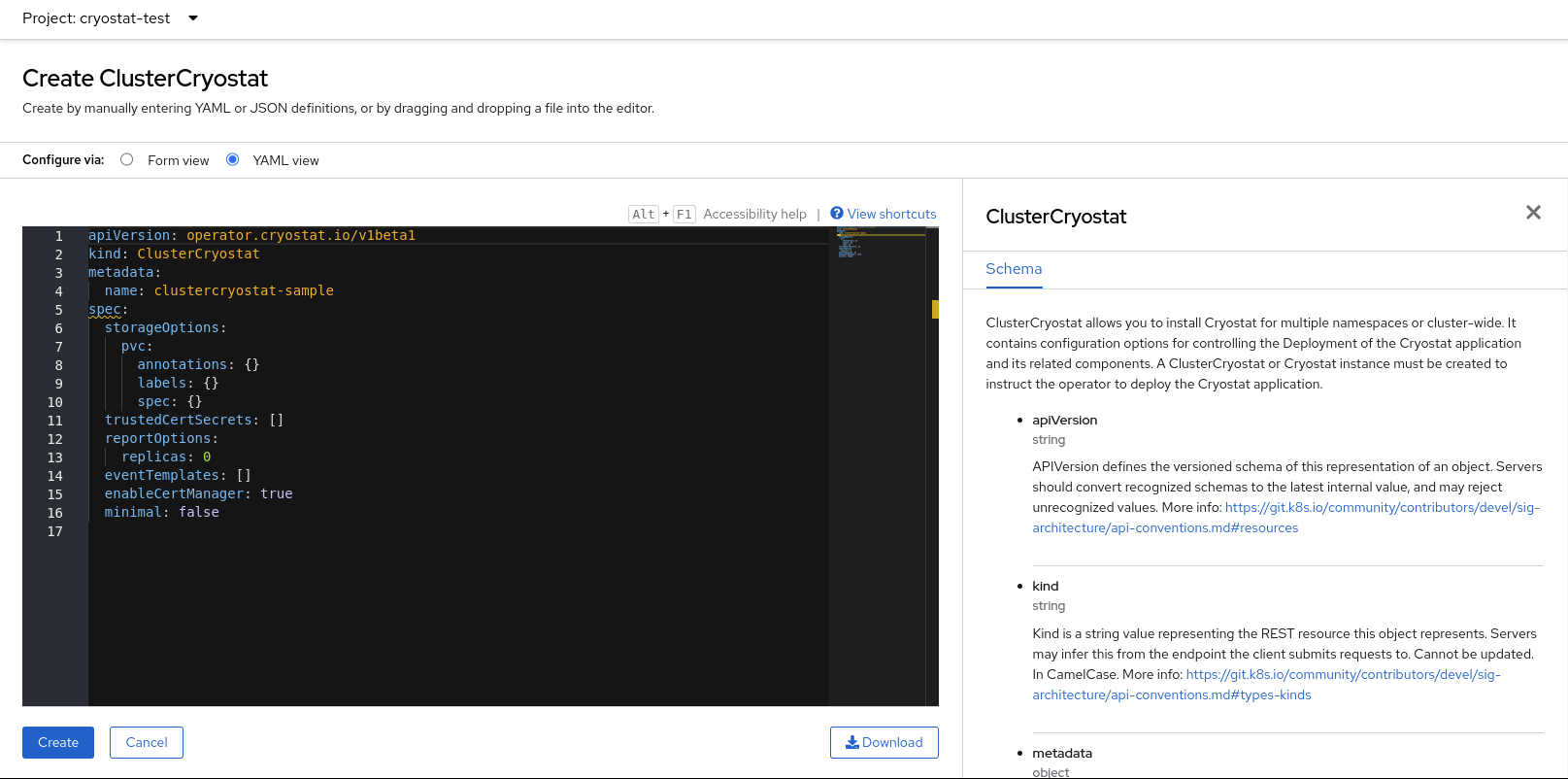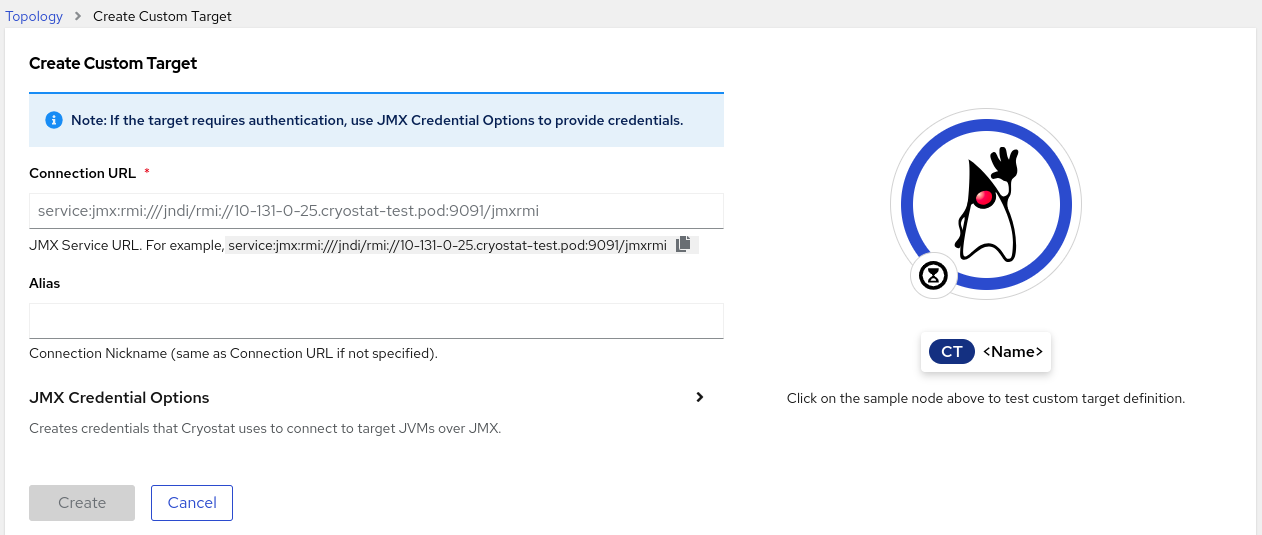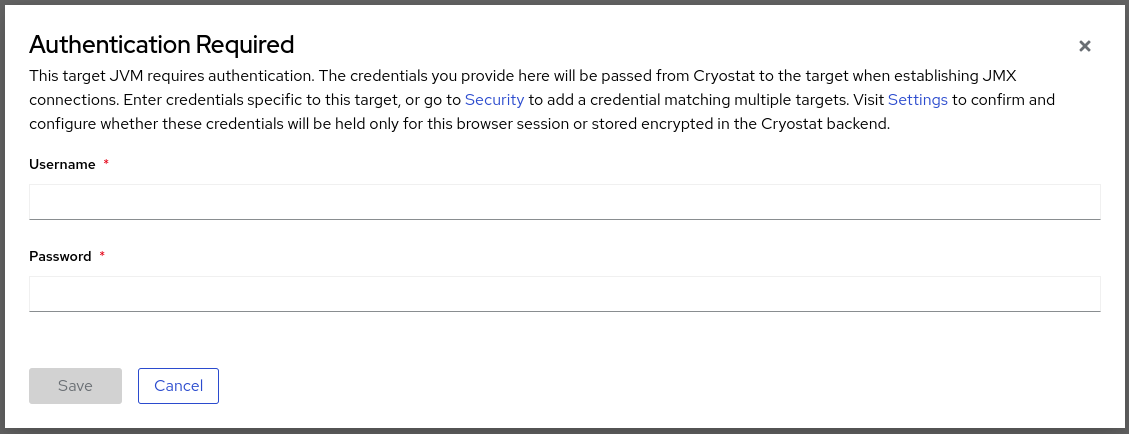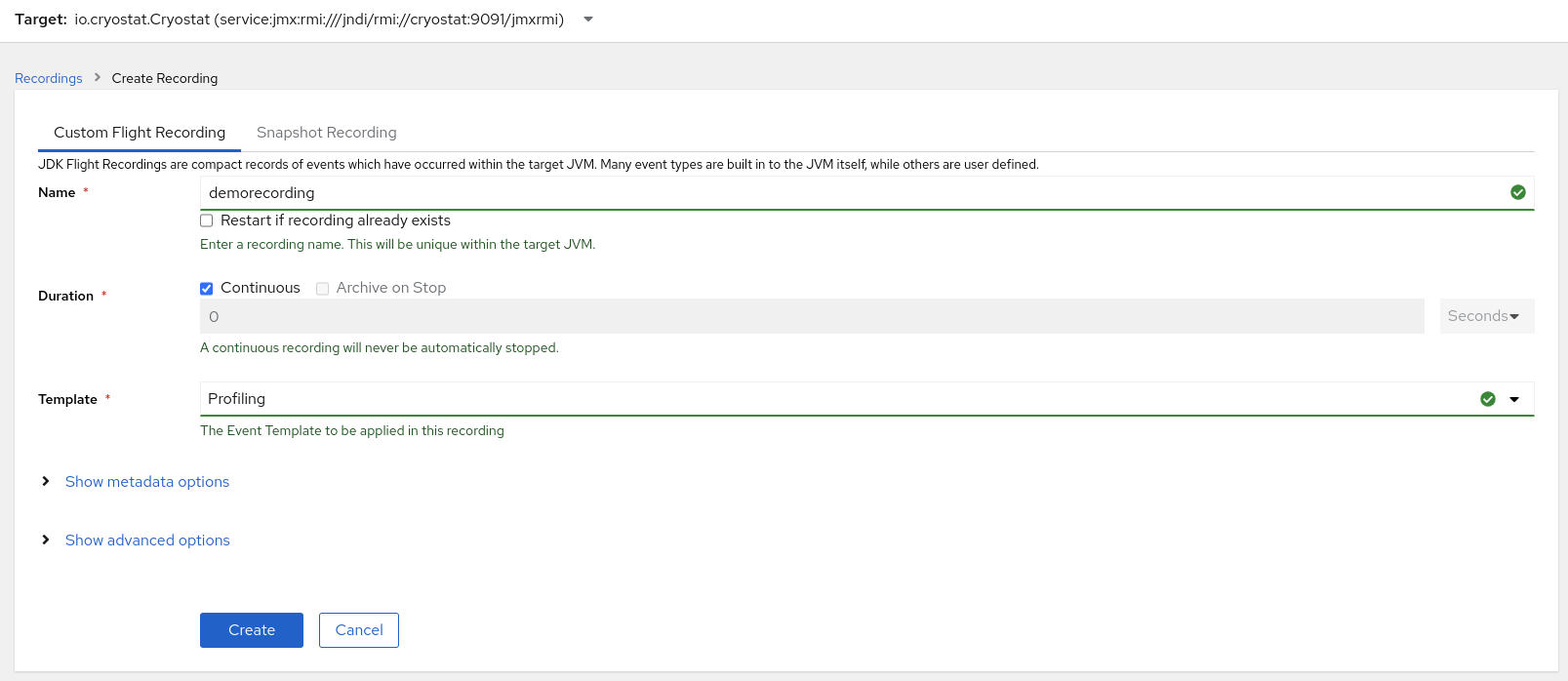Getting started with Cryostat
Abstract
Preface
The Red Hat build of Cryostat is a container-native implementation of JDK Flight Recorder (JFR) that you can use to securely monitor the Java Virtual Machine (JVM) performance in workloads that run on an OpenShift Container Platform cluster. You can use Cryostat 2.4 to start, stop, retrieve, archive, import, and export JFR data for JVMs inside your containerized applications by using a web console or an HTTP API.
Depending on your use case, you can store and analyze your recordings directly on your Red Hat OpenShift cluster by using the built-in tools that Cryostat provides or you can export recordings to an external monitoring application to perform a more in-depth analysis of your recorded data.
Red Hat build of Cryostat is a Technology Preview feature only. Technology Preview features are not supported with Red Hat production service level agreements (SLAs) and might not be functionally complete. Red Hat does not recommend using them in production. These features provide early access to upcoming product features, enabling customers to test functionality and provide feedback during the development process.
For more information about the support scope of Red Hat Technology Preview features, see Technology Preview Features Support Scope.
Making open source more inclusive
Red Hat is committed to replacing problematic language in our code, documentation, and web properties. We are beginning with these four terms: master, slave, blacklist, and whitelist. Because of the enormity of this endeavor, these changes will be implemented gradually over several upcoming releases. For more details, see our CTO Chris Wright’s message.
Chapter 1. Overview of Cryostat
Cryostat is a container-native Java application based on JDK Flight Recorder (JFR) that you can use to monitor Java Virtual Machine (JVM) performance for containerized workloads that run on a Red Hat OpenShift cluster.
You can deploy Cryostat in a container in a Red Hat OpenShift project that hosts your containerized Java applications. You can create JVM targets that correspond to the JVM instances that you use to run your containerized workload. You can connect Cryostat to the JVM targets to record and analyze data about heap and non-heap memory usage, thread count, garbage collection, and other performance metrics for each JVM target.
You can use the tools that are included with Cryostat to monitor the performance of your JVMs in real time, capture JDK Flight Recorder (JFR) recordings and snapshots, generate Automated Analysis reports, and visualize your recorded performance data by using a Grafana dashboard.
The Cryostat web console and HTTP API provides a way to analyze your JVM performance data inside the container without having to rely on an external monitoring application. However, you can also export your recordings from Cryostat into an external instance of JDK Mission Control (JMC) when you need to perform a deeper analysis of your data outside of a cluster environment.
Cryostat supports role-based access control (RBAC) as a standard feature of OpenShift Container Platform. You can configure different levels of authorization for each user role to ensure the privacy and integrity of your Flight Recording data.
You can install Cryostat inside a Red Hat OpenShift project by using Operator Lifecycle Manager (OLM).
You can also download the latest Cryostat component images from the Red Hat Ecosystem Catalog. The following container images exist for Cryostat 2.4 on the Red Hat Ecosystem Catalog:
- Cryostat
- Red Hat build of Cryostat Operator
- Red Hat build of Cryostat Operator bundle
- Cryostat reports
- Cryostat Grafana dashboard
- JFR data source
Chapter 2. Installing Cryostat on Red Hat OpenShift by using a Red Hat build of Cryostat Operator
You can use the Operator Lifecycle Manager (OLM) to install the Red Hat build of Cryostat Operator in a project on your Red Hat OpenShift cluster. You can use the Red Hat build of Cryostat Operator to create single namespace or multi-namespace Cryostat instances. You can control these instances by using a GUI that is accessible from the Red Hat OpenShift web console.
If you need to upgrade your Red Hat build of Cryostat Operator subscription from Cryostat 2.0 to Cryostat 2.4, you must change the update channel from stable-2.0 to stable.
Prerequisites
- Created an OpenShift Container Platform 4.11 or later cluster.
- Created a Red Hat OpenShift user account with permissions to install Red Hat build of Cryostat Operator in a project.
- Installed Operator Lifecycle Manager (OLM) on your cluster.
Installed cert-manager with the cert-manager Operator for Red Hat OpenShift.
- If you are using OpenShift Container Platform 4.11 or later, you can install the cert-manager Operator for Red Hat OpenShift. For more information, see cert-manager Operator for Red Hat OpenShift (OpenShift Container Platform).
- Logged in to Red Hat OpenShift by using the Red Hat OpenShift web console.
Procedure
- In your browser, navigate to Home > Projects by using the web console.
- Select the name of the project in which you want to install the Red Hat build of Cryostat Operator.
Install the Red Hat build of Cryostat Operator:
- In the navigation menu of your web console, navigate to Operators > OperatorHub.
- Select the Red Hat build of Cryostat Operator from the list. You can use the search box in the upper part of the screen to find the Red Hat build of Cryostat Operator.
To install the Red Hat build of Cryostat Operator in your project, click Install.
The Red Hat OpenShift web console prompts you to create a Cryostat custom resource (CR).
NoteIf you are installing a Cryostat instance that is enabled for multiple namespaces, in the Installation mode area, click the All namespaces on the cluster (default) radio button.
You can create the CR either manually or automatically. If you want to create the CR manually, see step 4. If you want to create the CR automatically, see step 5.
If you want to create the CR manually, complete the following steps:
Navigate to Operators > Installed Operators by using the web console and select Red Hat build of Cryostat Operator from the list of installed operators:
Figure 2.1. Viewing the Red Hat build of Cryostat operator in the list of installed operators
- Click the Details tab.
To create a single-namespace Cryostat instance, go to the Provided APIs section. Then, under Cryostat, click Create instance.
NoteIf you want to create a Cryostat instance that is enabled for multiple namespaces, in the Provided APIs section, select Cluster Cryostat and click Create instance. The Cluster Cryostat API has configuration options that control the deployment of the Cryostat application and its related components. For more information, see Creating Cryostat on multiple namespaces.
Figure 2.2. Selecting the Cryostat API that is provided by the Red Hat build of Cryostat Operator
- Click either the Form view radio button or the YAML view radio button. If you want to enter your information in the YAML configuration file, click YAML view .
- Specify a name for the instance of Cryostat that you want to create.
Optional: In the Labels field, specify a label or annotation for the Operand workload you want to deploy.
You can also specify additional configuration options for your deployment:
Figure 2.3. Creating an instance of Cryostat by using a form in the web console
Alternatively, you can use a YAML template to create your instance and specify additional configuration options instead of using the form:
Figure 2.4. Creating an instance of Cryostat by using a YAML template in the web console
If you want to create the CR by using the automatic prompt option, follow the prompt’s instructions and then complete the following steps:
- Click either the Form view radio button or the YAML view radio button. If you want to enter your information in the YAML configuration file, click YAML view.
- Specify a name for the instance of Cryostat that you want to create.
Optional: In the Labels field, specify a label or annotation for the Operand workload you want to deploy.
You can also specify additional configuration options for your deployment:
Figure 2.5. Creating an instance of Cryostat by using a form in the web console
Alternatively, you can use a YAML template to create your instance and specify additional configuration options instead of using the form:
Figure 2.6. Creating an instance of Cryostat by using a YAML template in the web console
To start the creation process for your Cryostat instance, click Create.
You must wait for all resources of your Cryostat instance to be ready before you can access it.
Verification
- In the navigation menu of the web console, click Operators, then click Installed Operators.
- From the table of installed operators, select Red Hat build of Cryostat Operator.
Select the Cryostat tab.
Your Cryostat instance opens in the table of instances and lists the following conditions:
-
TLSSetupCompleteis set totrue. -
MainDeploymentAvailableis set totrue. Optional: If you enabled the reports generator service then
ReportsDeploymentAvailableis shown and set totrue.Figure 2.7. Example of conditions set to True under the Status column for a Cryostat instance on OpenShift
-
Optional: Select your Cryostat instance from the Cryostat table. Go to the Cryostat Conditions table, where you can see more information for each condition.
Figure 2.8. Example of a Cryostat Conditions table that lists each condition and its criteria
Next Steps
2.1. Creating Cryostat on multiple namespaces
The Red Hat build of Cryostat Operator provides the Cluster Cryostat API, which you can use to create Cryostat instances that work across multiple namespaces.
Prerequisites
- Created an OpenShift Container Platform 4.11 or later cluster.
- Created a Red Hat OpenShift user account with permissions to install Red Hat build of Cryostat Operator in a project.
- Installed the Operator Lifecycle Manager (OLM) on your cluster.
Installed cert-manager by using the cert-manager Operator for Red Hat OpenShift.
- If you are using OpenShift Container Platform 4.11 or later, you can install the cert-manager Operator for Red Hat OpenShift.For more information, see cert-manager Operator for Red Hat OpenShift (OpenShift Container Platform).
- Logged in to Red Hat OpenShift by using the Red Hat OpenShift web console.
Procedure
- In your browser, navigate to Home > Projects by using the web console.
- Select the name of the project where you want to install the Red Hat build of Cryostat Operator.
Install the Red Hat build of Cryostat Operator.
The Red Hat OpenShift web console prompts you to create a Cryostat custom resource (CR).
To create the CR, complete the following steps:
Navigate to Operators > Installed Operators by using the web console and select Red Hat build of Cryostat Operator from the list of installed operators:
Figure 2.9. Viewing the Red Hat build of Cryostat Operator in the list of installed operators
- Click the Details tab.
To create a multi-namespace instance of Cryostat, go to the Provided APIs section. Then, under Cluster Cryostat, click Create instance.
Figure 2.10. Selecting the Cluster Cryostat API that is provided by the Red Hat build of Cryostat Operator
- Click either the Form view radio button or the YAML view radio button. If you want to enter your information in the YAML configuration file, click YAML view.
Specify a unique name for the Cluster Cryostat instance that you want to create.
NoteEnsure that the name you specify for your Cluster Cryostat instance is unique and does not conflict with the name of any single-namespace Cryostat instances that might already be created in the install namespace or target namespaces of the Cluster Cryostat instance.
Optional: In the Labels field, specify a label or annotation for the Operand workload you want to deploy.
You can also specify additional configuration options for your deployment:
Figure 2.11. Creating a Cluster Cryostat instance by using a form in the web console
In the Install Namespace field, select a namespace where you want to install this instance of Cryostat.
TipThe Red Hat build of Cryostat Operator uses a larger set of permissions compared to the Cryostat application, and Cryostat might have more permissions than your target workloads. Therefore, for optimal security, install the Cryostat instance into a different namespace from where the Red Hat build of Cryostat Operator operator is installed and from where your target workloads are located.
In the Target Namespaces field, select namespaces whose workloads you want to permit this instance of Cryostat to access and work with. Optionally, you can select the same namespace where you installed Cryostat or you can choose a different namespace. To add additional namespaces, click +Add Target Namespace.
ImportantUsers who can access the Cryostat instance have access to all target applications in any namespace that is visible to that Cryostat instance. Therefore, when you deploy a multi-namespace Cryostat instance, you must consider which namespaces to select for monitoring, which namespace to install Cryostat into, and which users you want to grant access to.
Alternatively, you can use a YAML template to create your instance and specify additional configuration options instead of using the form:
Figure 2.12. Creating a Cluster Cryostat instance by using a YAML template in the web console
Click Create to start the creation process for your Cryostat multi-namespace instance.
You must wait for all resources of your Cluster Cryostat instance to be ready before you can access the instance.
Verification
- In the navigation menu of the web console, navigate to Operators > OperatorHub.
- From the table of installed operators, select Red Hat build of Cryostat Operator.
Click the Cluster Cryostat tab.
Your Cryostat instance opens in the table of instances and lists the following conditions:
-
TLSSetupCompleteis set totrue. -
MainDeploymentAvailableis set totrue. Optional: If you enabled the reports generator service,
ReportsDeploymentAvailableis shown and set totrue.Figure 2.13. Example of conditions set to True under the Status column for a Cluster Cryostat instance on OpenShift
-
Optional: From the Cluster Cryostat table, select your Cryostat instance. Go to the Conditions table to view more information for each condition.
Figure 2.14. Example of a Cryostat Conditions table that lists each condition and its criteria
Additional resources
Chapter 3. Configuring Java applications
To enable Cryostat to gather, store, and analyze Java Flight Recorder (JFR) data about target applications that run on Java Virtual Machine (JVM)s, you must configure the applications so that Cryostat can detect and connect to them.
You can configure the applications in any of the following ways:
- By using the Cryostat agent component for detection and connectivity, which is implemented as a Java Instrumentation Agent and acts as a plug-in for applications that run on the JVM
- By configuring the applications to allow Java Management Extensions (JMX) connections and using an OpenShift Service for detection and JMX for connectivity
- By using the Cryostat agent for detection and JMX for connectivity
Cryostat agent
From Red Hat build of Cryostat 2.4 onward, the Cryostat agent provides an HTTP API that the Cryostat server can use as an alternative to an application’s JMX port. By attaching a properly configured Cryostat agent to the workload applications that you deploy, you can use the full Cryostat feature set without any need for the target applications to expose a JMX port.
Before Red Hat build of Cryostat 2.4, the Cryostat agent provided a read-only HTTP API that supported a limited set of JFR operations only.
The Cryostat agent’s HTTP API can offer the following benefits compared to a JMX port:
- Greater security due to the reduced API surface area
- Deployment flexibility due to the Cryostat agent’s dual role as a Cryostat discovery plug-in
If the Cryostat agent detects that JMX is also configured on your application, the agent publishes itself to the Cryostat server with both agent HTTP API definitions and JMX URL definitions. In this situation, you can use whichever configuration option you prefer.
To use the Cryostat agent with your workload application, you must configure the application to pass the -javaagent JVM flag with the path to the Cryostat agent‘s JAR file (for example, -javaagent:/deployment/app/lib/cryostat-agent.jar). This setting enables your workload application’s JVM to load and initialize the Cryostat agent at startup. Once the Cryostat agent’s basic initialization is complete, your workload application’s normal startup process begins as usual.
Options for including the agent’s JAR file into your workload application
You can include the Cryostat agent’s JAR file into the workload application in different ways:
-
The simplest option is to add the JAR file to your application’s dependencies in the
pom.xmlorbuild.gradlefile. Your build tool (Maven or Gradle) downloads the JAR file for inclusion in your application build output. -
You can use a Maven plug-in, such as the
maven-dependency-plugin, to provide more fine-grained control over the download and inclusion of the JAR file in the application build output. -
You can create a PersistentVolume storage volume that contains the JAR file. Then reconfigure your application’s
Deployment/DeploymentConfigto mount the PersistentVolume and use-javaagent:/path/to/persistentvolume/cryostat-agent.jar. The exact way to accomplish this task depends on the type of PersistentVolume provider you enabled in your OpenShift cluster.
Once the Cryostat agent is successfully added to your application container and loaded, your application’s stdout and console logs start displaying log messages from the Cryostat agent.
Agent configuration properties
You can specify configuration properties for the Cryostat agent in either of two ways:
-
Use JVM system property flags on the application (for example,
-Dcryostat.agent.api.writes-enabled=true). -
Use environment variables by making all letters upper case and replacing any punctuation with underscores (for example,
CRYOSTAT_AGENT_API_WRITES_ENABLED=true).
You must configure the following properties to enable the Cryostat agent to operate successfully:
|
|
This specifies the URL location of the Cryostat server back end that the Cryostat agent advertises itself to (that is, the internal OpenShift Service object) such as |
|
|
This specifies the URL location of the Cryostat agent instance or application itself. Cryostat uses this URL to perform health checks and request data from the agent. You can use the OpenShift/Kubernetes Downward API to determine this dynamically. For more information, see the Kubernetes Downward API documentation on |
Depending on your setup requirements, you can also configure the following agent properties:
|
|
This indicates whether the Cryostat agent allows write operations. This is set to Note
Even if this property is set to |
|
| This specifies the HTTP port number that the agent uses to bind its HTTP API (by default, 9977). If this conflicts with an existing port that your application or another tooling agent uses, you must specify a different port number. |
|
|
This specifies a label for identifying which application this Cryostat agent instance is attached to (by default, |
Remote Java Management Extensions (JMX) connections
JMX is a standard feature on a JVM with which you can monitor and manage target applications that run on the JVM. For Cryostat to use JMX, you must enable and configure JMX when you start the JVM because Cryostat requires the target applications to expose a JMX port.
Cryostat communicates with the target applications over this JMX port to start and stop JFR recordings and to pull JFR data over the network, enabling Cryostat to store and analyze this JFR data. Remote monitoring requires security to ensure that unauthorized persons cannot access application. Cryostat prompts you to enter your credentials before Cryostat can access any of the application’s JFR recordings.
Cryostat agent and JMX hybrid
You can configure your target applications to use a hybrid approach where you use both the Cryostat agent and JMX. With this approach, you use the Cryostat agent to detect the target applications and JMX to expose the JFR data to Cryostat, which allows for more flexibility.
For example, you can use the agent to detect the applications without needing to depend on specific port numbers and also use the JMX connections to start and stop JFR flight recordings on demand.
3.1. Configuring applications by using the Cryostat agent
You can use the Cryostat agent, implemented as a Java Instrumentation Agent, to configure target applications, so that Cryostat can detect the applications, collect data, and send the data to Cryostat for analysis. You can also optionally enable the Cryostat agent to accept requests from the Cryostat server to start, stop, and delete JFR recordings.
Red Hat build of Cryostat 2.4 distributes two different variations of the Cryostat agent’s JAR file. Depending on your setup requirements, you can use either of the following types of agent JAR file:
An all-in-one "shaded" JAR file that is self-contained and includes the agent code and all of its dependencies
This "shaded" JAR file provides the most convenient form of Cryostat agent to include in your existing applications, because you need to include only one additional agent JAR file. This is a common distribution pattern for similar agents and tools.
A standard JAR file that contains the agent code without any dependencies
This type of JAR file is useful if you know that dependency conflicts exist between the agent and your workload applications. If you intend to apply your own strategies to provide the correct versions of each dependency to satisfy both the agent and your applications’ requirements, you can use the standalone JAR file.
Previous releases provided one distribution of the Cryostat agent, which was an all-in-one "shaded" `JAR file. The following procedure describes how to install the "shaded" JAR file distribution of the Cryostat 2.4 agent.
As described in Configuring Java applications: Cryostat agent, the Cryostat 2.4 agent supports different options for including the agent’s JAR file into your workload applications. The following procedure describes how to add the "shaded" JAR file to your application’s dependencies in the pom.xml or build.gradle file.
Prerequisites
- Logged in to your Cryostat web console.
- Installed JDK version 11 or later.
Procedure
Install the Cryostat agent. Choose one of the following options, depending on your application build:
Using Maven:
Update the application
pom.xmlfile with the Cryostat agent JAR file information.Example pom.xml
Copy to Clipboard Copied! Toggle word wrap Toggle overflow The next time you build your application, the Cryostat agent JAR file is available at
target/dependency/cryostat-agent-shaded.jar.Using Gradle:
Update the
build.gradlefile.Example
build.gradlefileCopy to Clipboard Copied! Toggle word wrap Toggle overflow How you package the agent JAR file into the application depends on the Gradle plug-ins that you use for the build. For example, if you are using the Jib plug-in, update the
build.gradlefile as follows:Example
build.gradlefileCopy to Clipboard Copied! Toggle word wrap Toggle overflow
Update the Docker file. The following example uses the
JAVA_OPTSenvironment variable to pass the relevant JVM information.Example
... COPY target/dependency/cryostat-agent.jar /deployments/app/ ... ENV JAVA_OPTS="-javaagent:/deployments/app/cryostat-agent-shaded.jar"
... COPY target/dependency/cryostat-agent.jar /deployments/app/ ... ENV JAVA_OPTS="-javaagent:/deployments/app/cryostat-agent-shaded.jar"Copy to Clipboard Copied! Toggle word wrap Toggle overflow Rebuild the container image that is specific to your application.
docker build -t docker.io/myorg/myapp:latest -f src/main/docker/Dockerfile
docker build -t docker.io/myorg/myapp:latest -f src/main/docker/DockerfileCopy to Clipboard Copied! Toggle word wrap Toggle overflow To supply the JVM system properties or environment variables that you need to configure the Cryostat agent, push the updated image and then modify your application deployment.
Example
Copy to Clipboard Copied! Toggle word wrap Toggle overflow -
<1>: Port number
9977is the default HTTP port that the agent exposes for the internal web server that services Cryostat requests. You can change this port number if it conflicts with your target application into which the agent is installed. -
<2>: The
CRYOSTAT_AGENT_AUTHORIZATIONvalue shows the credentials that the agent includes in the API requests to Cryostat to advertise its own presence or to push JFR data. You can also create a KubernetesService Accountfor this purpose and replaceabcd1234with the base64-encoded authentication token associated with the service account. -
<3>: The
CRYOSTAT_AGENT_API_WRITES_ENABLEDvariable is set tofalseby default. If you want the Cryostat agent to accept requests from the Cryostat server to start, stop, or delete JFR flight recordings, you must set this variable totrue.
-
<1>: Port number
3.2. Configuring applications by using JMX connections
For Cryostat to detect and communicate with your target Java applications, you can configure the applications to allow remote Java Management Extensions (JMX) connections.
Prerequisites
- Logged in to your Cryostat web console.
- Created a Cryostat instance in your project.
Procedure
To enable remote JMX connections, complete the following steps:
On your application, define the following Java system property:
-Dcom.sun.management.jmxremote.port=<port_num>
-Dcom.sun.management.jmxremote.port=<port_num>Copy to Clipboard Copied! Toggle word wrap Toggle overflow NoteTo add the
-Dcom.sun.management.jmxremote.port=<port_num>property without having to rebuild the target application, you can set theJAVA_OPTS_APPENDenvironment variable on the application.JAVA_OPTS_APPENDis an environment variable that is used by Red Hat Universal Base Images (UBI) only.If you use Red Hat UBI to build application images, set the
JAVA_OPTS_APPENDvariable at build time in the application Docker file, or at runtime by running the following command:oc set env deployment <name> JAVA_OPTS_APPEND="..."
oc set env deployment <name> JAVA_OPTS_APPEND="..."Copy to Clipboard Copied! Toggle word wrap Toggle overflow If you do not use Red Hat UBI to build application images, refer to the documentation for your base image for information about how to add the Java system properties at build time or runtime.
Specify that the application listens for remote JMX connections by allowing traffic to the application. Use an Red Hat OpenShift Service and specify the following values for its remote JMX port:
Example
service.yamlCopy to Clipboard Copied! Toggle word wrap Toggle overflow
Secure the remote JMX connections:
Enable and configure authentication and SSL/TLS for the remote JMX connections in your application:
Copy to Clipboard Copied! Toggle word wrap Toggle overflow Configure Cryostat to trust the application TLS certificate. Create a secret for the application in the same namespace as your Cryostat application and configure Cryostat to refer to the secret. To create a secret for the certificate, run the following command:
oc create secret generic myapp-cert --from-file=tls.crt=/path/to/cert.pem
oc create secret generic myapp-cert --from-file=tls.crt=/path/to/cert.pemCopy to Clipboard Copied! Toggle word wrap Toggle overflow NoteThe certificate must be in a
.pemfile format.- When you create your Cryostat instance, add the secret to the list of trusted TLS certificates. For more information, see Configuring TLS certificates.
To allow your applications to verify that Cryostat is connecting to them by a means other than password authentication, enable TLS client authentication:
-Dcom.sun.management.jmxremote.ssl.need.client.auth=true -Djavax.net.ssl.trustStore=</path/to/truststore> -Djavax.net.ssl.trustStorePassword=<password>
-Dcom.sun.management.jmxremote.ssl.need.client.auth=true -Djavax.net.ssl.trustStore=</path/to/truststore> -Djavax.net.ssl.trustStorePassword=<password>Copy to Clipboard Copied! Toggle word wrap Toggle overflow NoteTLS client authentication requires the cert-manager operator for Red Hat OpenShift.
If you use TLS client authentication for remote JMX connections, the application truststore must contain a Cryostat certificate. The Cryostat operator cert-manager integration creates a self-signed certificate for the Cryostat deployment. This certificate is located in the
<cryostat>-tlssecret, where <cryostat> is the name of the Cryostat instance you created.NoteThe cert-manager Operator also places a Java keystore truststore in the secret.
To mount this truststore in your application deployment, run the following command, replacing "<myapp>" with the name of your application deployment and "<cryostat>" with the name of your Cryostat instance:
oc set volumes deploy <myapp> --add --name=truststore \ --secret-name=<cryostat>-tls --sub-path=truststore.p12 \ --mount-path=/var/run/secrets/<myapp>/truststore.p12
oc set volumes deploy <myapp> --add --name=truststore \ --secret-name=<cryostat>-tls --sub-path=truststore.p12 \ --mount-path=/var/run/secrets/<myapp>/truststore.p12Copy to Clipboard Copied! Toggle word wrap Toggle overflow The Cryostat operator generates the truststore password, which you can find in the
<cryostat>-keystoresecret. To mount this as an environment variable in your application deployment, run the following command:oc set env deploy <myapp> --from='secret/<cryostat>-keystore'
oc set env deploy <myapp> --from='secret/<cryostat>-keystore'Copy to Clipboard Copied! Toggle word wrap Toggle overflow Configure the Java arguments for the container. Run the following commands:
-Dcom.sun.management.jmxremote.ssl.need.client.auth=true -Djavax.net.ssl.trustStore=/var/run/secrets/<myapp>/truststore.p12 -Djavax.net.ssl.trustStorePassword="$(KEYSTORE_PASS)"
-Dcom.sun.management.jmxremote.ssl.need.client.auth=true -Djavax.net.ssl.trustStore=/var/run/secrets/<myapp>/truststore.p12 -Djavax.net.ssl.trustStorePassword="$(KEYSTORE_PASS)"Copy to Clipboard Copied! Toggle word wrap Toggle overflow WarningIf you deployed Cryostat and your applications in a testing environment, you might want to configure the target applications without any JMX or TLS authentication. You can do so by using the following set of Java system properties, however, this configuration is not secure and not recommended.
-Dcom.sun.management.jmxremote.port=<port_num> -Dcom.sun.management.jmxremote.ssl=false -Dcom.sun.management.jmxremote.authenticate=false
-Dcom.sun.management.jmxremote.port=<port_num> -Dcom.sun.management.jmxremote.ssl=false -Dcom.sun.management.jmxremote.authenticate=falseCopy to Clipboard Copied! Toggle word wrap Toggle overflow
3.3. Configuring applications by using the Cryostat agent and JMX connections
You can configure target applications that run on Java Virtual Machines (JVM) to use a combination of the Cryostat agent and Java Management Extensions (JMX) connections to detect and communicate with the target applications.
You use the Cryostat agent to detect and communicate with the target application and use JMX to expose the Java Flight Recorder (JFR) data.
You must configure the Cryostat agent to communicate with Cryostat about itself and that the agent is reachable through JMX rather than through HTTP.
Prerequisites
- Logged in to your Cryostat web console.
- Created a Cryostat instance in your project.
Procedure
Install the Cryostat agent. For application builds that use Maven, update the application
pom.xmlfile with the Cryostat agent JAR file information.Example
pom.xmlfileCopy to Clipboard Copied! Toggle word wrap Toggle overflow Modify your application deployment:
Example
Copy to Clipboard Copied! Toggle word wrap Toggle overflow <1>: To configure authentication and SSL/TLS for the JMX connections and view further configuration options, see Configuring applications by using JMX connections.
To enable Cryostat to detect the target application and connect to the Cryostat agent, configure an application
Service:Example
Copy to Clipboard Copied! Toggle word wrap Toggle overflow
Chapter 4. Creating a JFR recording with Cryostat
With Cryostat, you can create a JDK Flight Recorder (JFR) recording that monitors the performance of your JVM in your containerized application. Additionally, you can take a snapshot of an active JFR recording to capture any collected data, up to a specific point in time, for your target JVM application.
4.1. Creating a JFR recording in the Cryostat web console
You can create a JFR recording that monitors the performance of your JVM located in your containerized application. After you create a JFR recording, you can start the JFR to capture real-time data for your JVM, such as heap and non-heap memory usage.
Prerequisites
- Installed Cryostat 2.4 on Red Hat OpenShift by using the OperatorHub option.
- Created a Cryostat instance in your Red Hat OpenShift project.
Logged in to your Cryostat web console.
- You can retrieve your Cryostat application’s URL by using the Red Hat OpenShift web console.
Procedure
On the Dashboard panel for your Cryostat web console, select a target JVM from the Target list.
NoteDepending on how you configured your target applications, your target JVMs might be using a JMX connection or an agent HTTP connection. For more information about configuring your target applications, see Configuring Java applications.
ImportantIf your target JVM is using an agent HTTP connection, ensure that you set the
cryostat.agent.api.writes-enabledproperty totruewhen you configured your target application to load the Cryostat agent. Otherwise, the Cryostat agent cannot accept requests to start and stop JFR recordings.Figure 4.1. Example of selecting a Target JVM for your Cryostat instance
Optional: On the Dashboard panel, you can create a target JVM. From the Target list, click Create Target. The Create Custom Target window opens.
- In the Connection URL field, enter the URL for your JVM’s Java Management Extension (JMX) endpoint.
- Optional: To test if the Connection URL that you specified is valid, click the Click to test sample node image. If there is an issue with the Connection URL, an error message is displayed that provides a description of the issue and guidance to troubleshoot.
- Optional: In the Alias field, enter an alias for your JMX Service URL.
Click Create.
Figure 4.2. Create Custom Target window
- From the navigation menu on the Cryostat web console, click Recordings.
Optional: Depending on how you configured your target JVM, an Authentication Required dialog might open on your web console. In the Authentication Required dialog box, enter your Username and Password. To provide your credentials to the target JVM, click Save.
Figure 4.3. Example of a Cryostat Authentication Required window
NoteIf the selected target JMX has Secure Socket Layer (SSL) certification enabled for JMX connections, you must add its certificate when prompted.
Cryostat encrypts and stores credentials for a target JVM application in a database that is stored on a persistent volume claim (PVC) on Red Hat OpenShift. See Storing and managing credentials (Using Cryostat to manage a JFR recording).
On the Active Recordings tab, click Create.
Figure 4.4. Example of creating an active recording
On the Custom Flight Recording tab:
- In the Name field, enter the name of the recording you want to create. If you enter a name in an invalid format, the web console displays an error message.
If you want Cryostat to automatically restart an existing recording, select the Restart if recording already exists check box.
NoteIf you enter a name that already exists but you do not select Restart if recording already exists, Cryostat refuses to create a custom recording when you click the Create button.
- In the Duration field, select whether you want this recording to stop after a specified duration or to run continuously without stopping. If you want Cryostat to automatically archive your new JFR recording after the recording stops, click Archive on Stop.
- In the Template field, select the template that you want to use for the recording.
The following example shows continuous JVM monitoring, which you can enable by selecting Continuous from above the Duration field. This setting means that the recording will continue until you manually stop the recording. The example also shows selection of the Profiling template from the Template field. This provides additional JVM information to a JFR recording for troubleshooting purposes.
Figure 4.5. Example of creating a custom flight recording
To access more options, click the following expandable hyperlinks:
- Show advanced options, where you can select additional options for customizing your JFR recording.
- Show metadata options, where you can add custom labels and metadata to your JFR recording.
To create your JFR recording, click Create. The Active Recordings tab opens and lists your JFR recording.
Your active JFR recording starts collecting data on the target JVM location inside your containerized application. If you specified a fixed duration for your JFR recordings, the target JVM stops the recording when it reaches the fixed duration setting. Otherwise, you must manually stop the recording.
Optional: On the Active Recording tab, you can also stop the recording.
- Select the checkbox next to the JFR recording’s name. On the toolbar in the Active Recordings tab, the Cryostat web console activates the Stop button.
Click Stop. The JFR adopts the
STOPPEDstatus, so it stops monitoring the target JVM. The JFR still shows under the Active Recording tab.Figure 4.6. Example of stopping an active recording
ImportantJFR recording data might be lost in the following situations:
- Target JVM fails
- Target JVM restarts
- Target JVM Red Hat OpenShift Deployment is scaled down
Archive your JFR recordings to ensure you do not lose your JFR recording’s data.
4.2. Creating snapshots from an active recording
You can take a snapshot of an active JFR recording to capture any collected data, up to a specific point in time, for your target JVM application. A snapshot is like a checkpoint marker that has a start point and an end point for a given time segment in a running JFR recording.
A snapshot gets stored in the memory of a target JVM application. This differs from an archive in that Cryostat stores an archive on a cloud storage disk, which is a more permanent solution for storing a JFR recording’s data.
You can take snapshots of recordings if you want to experiment with different configuration changes among active JFR recordings.
When you create a snapshot for your JFR recording, Cryostat creates a new target JVM named snapshot -<snapshot_number>, where <snapshot_number> is the number that Cryostat automatically assigns to your snapshot.
A target JVM recognizes a snapshot as an active recording. Cryostat sets any JFR snapshots in the STOPPED state, which means that the JFR snapshot does not record new data to the target JVM. Depending on the JFR configuration, active JFR recordings can continue to monitor the target JVM regardless of the number of snapshots taken.
For a JFR recording that you set for continuous monitoring of a target JVM application, ensure that you create archived recordings to avoid losing JFR recording data.
If you choose to take regular snapshots to store your JFR recording data, the target JVM application might free some of its data storage space by replacing older recording data with newer recording data.
Prerequisites
- Entered your authentication details for your Cryostat instance.
- Created a target JVM recording and entered your authenticated details to access the Recordings menu. See Creating a JDK Flight Recorder (JFR) recording (Creating a JFR recording with Cryostat).
Procedure
On the Active Recordings tab, click the Create button. A new window opens on the web console.
Figure 4.7. Example of creating an active recording
Click the Snapshot Recording tab.
Figure 4.8. Example of creating a snapshot recording
Click Create. The Active Recordings table opens and it lists your JFR snapshot recording. The following example shows a JFR snapshot recording named
snapshot-3.Figure 4.9. Example of a completed snapshot recording
NoteYou can identify snapshots by the snapshot prefix from the list of active recordings.
Next steps
- To archive your JFR snapshot recording, see Archiving JDK Flight Recorder (JFR) recordings.
4.3. Labels for JFR recordings
When you create a JDK Flight Recorder (JFR) recording on Cryostat 2.4, you can add metadata to the recording by specifying a series of key-value label pairs.
Additionally, you can attach custom labels to JFR recordings that are inside a target JVM, so that you can easily identify and better manage your JFR recordings.
The following list details some common recording label use cases:
- Attach metadata to your JFR recording.
- Perform batch operations on recordings that contain identical labels.
- Use labels when running queries on recordings.
You can use Cryostat to create a JFR recording that monitors the performance of your JVM in your containerized application. Additionally, you can take a snapshot of an active JFR recording to capture any collected data, up to a specific point in time, for your target JVM application.
4.3.1. Adding labels to JFR recordings
When you create a JFR recording on Cryostat 2.4, you can use labels to add metadata that contain key-value label pairs to the recording.
Cryostat applies default recording labels to a created JFR recording. These default labels capture information about the event template that Cryostat used to create the JFR recording.
You can add custom labels to your JFR recording so that you can run specific queries that meet your needs, such as identifying specific JFR recordings or performing batch operations on recordings with the same applied labels.
Prerequisites
- Logged in to your Cryostat web console.
- Created or selected a target JVM for your Cryostat instance.
Procedure
- From your Cryostat web console, click Recordings.
- Under the Active Recordings tab, click Create.
On the Custom Flight Recording tab, expand Show metadata options.
NoteOn the Custom Flight Recording tab, you must complete any mandatory field that is marked with an asterisk.
Click Add label.
Figure 4.10. The Add Label button that is displayed under the Custom Flight Recording tab
- Enter values in the provided Key and Value fields. For example, if you want to file an issue with the recordings, you could enter the reason in the Key field and then enter the issue type in the Value field.
Click Create to create your JFR recording. Your recording is then shown under the Active Recordings tab along with any specified recording labels and custom labels.
TipYou can access archived JFR recordings from the Archives menu. See Uploading a JFR recording to Cryostat archives location (Using Cryostat to manage a JFR recording).
Example
The following example shows two default recording labels, template.name: Profiling and template.type: TARGET, and one custom label, reason:service-outage.
Figure 4.11. Example of an active recording with defined recording labels and a custom label
4.3.2. Editing a label for your JFR recording
On the Cryostat web console, you can navigate to the Recordings menu and then edit a label and its metadata for your JFR recording. You can also edit the label and metadata for a JFR recording that you uploaded to archives.
Prerequisites
- Logged in to your Cryostat web console.
- Created a JFR recording and attach labels to this recording.
Procedure
- On your Cryostat web console, click the Recording menu.
- From the Active Recordings tab, locate your JFR recording, and then select the checkbox next to it.
Click Edit Labels. An Edit Recording Label pane opens in your Cryostat web console, which you can use to add, edit, or delete labels for your JFR recording.
TipYou can select multiple JFR recordings by selecting the checkbox that is next to each recording. Click the Edit Labels button if you want to bulk edit recordings that contain the same labels or add new identical labels to multiple recordings.
Optional: You can perform any of the following actions from the Edit Recording Labels pane:
- Click Add to create a label.
-
Delete a label by clicking the
Xnext to the label. - Edit a label by modifying any content in a field. After you edit content, a green tick is shown in the field to indicate an edit.
- Click Save.
Optional: You can archive your JFR recordings along with their labels by completing the following steps:
- Select the checkbox next to the recording’s name.
Click the Archive button. You can locate your recording under the Archived Recordings tab.
By archiving your recording with its labels, you can enhance your search capabilities when you want to locate the recording at a later stage. You can also add additional labels to any recording that you uploaded to the Cryostat archives.
NoteCryostat preserves any labels with the recording for the lifetime of the archived recording.
Verification
- From the Active Recordings tab, check that your changes display under the Labels section for your recording.
Revised on 2024-03-06 19:01:14 UTC

